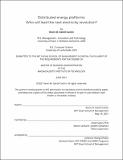| dc.contributor.advisor | Sastry, Anjali | |
| dc.contributor.author | Gentil-Cantin, Kevin M. | |
| dc.date.accessioned | 2022-04-13T17:29:32Z | |
| dc.date.available | 2022-04-13T17:29:32Z | |
| dc.date.issued | 2021-06 | |
| dc.date.submitted | 2021-06-10T19:13:11.930Z | |
| dc.identifier.uri | https://hdl.handle.net/1721.1/141893 | |
| dc.description.abstract | Climate change is forcing rapid change in the energy landscape. Two opposing paths represent plausible futures for the US power sector: centralization vs. distribution. Without trying to predict its likelihood, this thesis explores the implications of one of these paths, a distributed energy future. My objective is to investigate who could become the leader of this revolutionized industry. I specifically explore the potential role of three types of actors: privately-owned Utilities, energy-software Startups, and Large Tech companies, whom many do not yet factor into their assessment despite what I consider to be their vast scope to shape outcomes.
A literature review establishes the broad contours of a distributed energy future. I find that existing scenarios predict a more complex energy system and that intermittency would become a significant issue. I consider the role of distributed energy resources (DER) as a viable solution if built on digital platforms. To draw out the implications of these observations, I conducted nine in-depth interviews with executives. The analysis yielded four key insights: a distributed system would be a revolution for the industry; Utilities are under much pressure, putting their leading position at risk; Startups are in a position of dependency and cannot take the lead alone; Large Tech are much closer to playing an active role than it looks at first glance.
I sketch out comparisons with recent history to suggest that Large Tech companies should be considered as serious contenders for the leading role of a decentralized energy industry. I extend my analysis to the unique case of Tesla, also in a position of strength in this plausible future. I conclude this thesis by estimating that the answer depends on how utilities will act in this future, either by transforming themselves fast enough or letting Large Tech companies take over. | |
| dc.publisher | Massachusetts Institute of Technology | |
| dc.rights | In Copyright - Educational Use Permitted | |
| dc.rights | Copyright retained by author(s) | |
| dc.rights.uri | https://rightsstatements.org/page/InC-EDU/1.0/ | |
| dc.title | Distributed energy platforms: Who will lead the next electricity revolution? | |
| dc.type | Thesis | |
| dc.description.degree | M.B.A. | |
| dc.contributor.department | Sloan School of Management | |
| mit.thesis.degree | Master | |
| thesis.degree.name | Master of Business Administration | |

